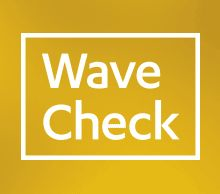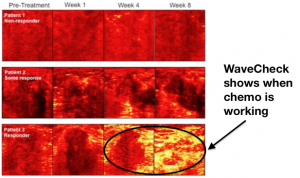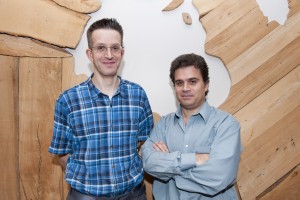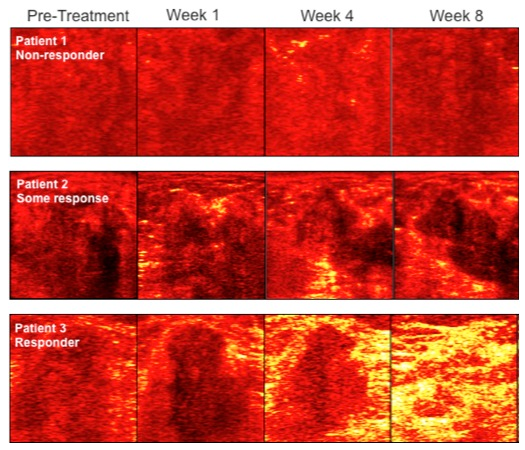OICR’s catalyst grant enables WaveCheck to open first partner site at MD Anderson Cancer Center in May
 TORONTO, April 8, 2014 — People with breast cancer are a step closer to knowing if their tumour is responding to chemotherapy at the start of treatment, thanks to a $100,000 catalyst grant from the Ontario Institute for Cancer Research (OICR).
TORONTO, April 8, 2014 — People with breast cancer are a step closer to knowing if their tumour is responding to chemotherapy at the start of treatment, thanks to a $100,000 catalyst grant from the Ontario Institute for Cancer Research (OICR).
The funding builds upon MaRS Innovation‘s Indiegogo crowdfunding campaign for WaveCheck, which successfully raised over $50,000 from over 500 supporters worldwide in two months last fall.
Read Jane Gerster’s article for the Toronto Star about OICR’s catalyst grant for WaveCheck. This announcement was also covered in Metro, BetaKit and Council of Academic Hospitals of Ontario’s Catalyst newsletter.
WaveCheck, a clinical technique invented, refined and tested by scientists at Sunnybrook Health Sciences Centre and Ryerson University over 20 years, aims to show whether chemotherapy is actually destroying a breast cancer tumour at the beginning of chemotherapy treatment (in as little as four weeks), rather than at the end of treatment (typically four to six months).

In early clinical testing, the non-invasive, image-guided technology has shown promise as an accurate, efficient way to monitor tumour response, opening the door to tailored treatment.
“This is a significant step towards achieving the goal of personalized medicine. The clinical trials will confirm that information provided by WaveCheck can determine if the treatment is the appropriate one or that other options should be chosen, sparing patients the side effects of treatments that will not likely be successful,” said Dr. Tom Hudson, OICR’s president and scientific director. “If successful, WaveCheck could become a standard tool in the cancer treatment of the future.”
Thanks to help from OICR’s funding, 20 women within Canada and 20 in the United States with locally-advanced breast cancer will participate in a clinical study at Sunnybrook and MD Anderson Cancer Center, beginning in May.
The WaveCheck crowdfunding campaign was twice–named to The Globe and Mail‘s Report on Small Business’ Top 10 list for the most financially successful Canadian crowdfunding campaigns on both Kickstarter and Indiegogo, but fell short of its $96,987 goal to fully fund the first partner study site at MD Anderson.

With OICR’s funding, the technology’s inventors, Dr. Gregory Czarnota, director of the cancer research program at Sunnybrook Research Institute and chief of Radiation Oncology at Sunnybrook’s Odette Cancer Centre, and Michael C. Kolios, professor of Physics and Canada Research Chair in Biomedical Applications of Ultrasound at Ryerson University, will begin collecting the data they need to refine the technology and show that the clinical technique consistently produces the same results for other world-leading cancer clinics.
“Clinical testing is how we get our innovations to patients, and this one has shown remarkable preliminary results in that arena,” said Dr. Michael Julius, vice-president of research at Sunnybrook. “Taking it to this next stage will help crystalize those results. Critical to this progress is partnership with those that likewise prioritize investment in tomorrow’s health care. We have had such partners in the federal and provincial governments, notably MaRS Innovation, and we are pleased that OICR is now part of this concerted effort.”
WaveCheck has been used in clinical studies with over 150 women; its first results were published in Clinical Cancer Research and Translational Oncology. The technology aims to create greater transparency through dialogue between breast cancer patients and their doctors, empowering them to participate in discussions about whether a given chemotherapy treatment is effective.
“If these clinical studies replicate the early studies, we could use this technology to monitor tumour response early in treatment and to predict which patients will continue on in their therapy to have a complete pathological response,” said Wei Yang, M.D., professor of Diagnostic Imaging at The University of Texas MD Anderson Cancer Center and clinician lead at the designated partner site. “On the other hand, for patients in whom the test indicates a poor response to treatment, the regimen could be changed to a more efficacious one.”
“WaveCheck’s campaign showcased MaRS Innovation’s ingenuity and willingness to embrace new funding sources on behalf of disruptive technologies emerging from our membership,” said Dr. Raphael Hofstein, president and CEO. “People all over the world took interest in this promising technology, and we were joined by many partners. We’re proud to welcome OICR into their company, bringing the campaign to a successful conclusion and ushering Greg and Michael’s research into this next important phase.”
Two additional partner study sites are planned with Princess Margaret Cancer Centre and London Health Sciences Centre. The WaveCheck team continues to seek additional funds to open them as quickly as possible.
To support WaveCheck now, visit the Sunnybrook Foundation website and enter “WaveCheck” in the comments field when making a donation.
By Elizabeth Monier-Williams, director of marketing and communications

